Civil Lines, Karachi
Civil Lines (Urdu: سول لاینز) is an upmarket neighbourhood in Karachi, Pakistan that was where much of Karachi's British officials and local elite resided during the colonial era.[1] Numerous buildings of architectural significance are located in the locality, including civic administration buildings, churches, mansions, and social clubs.
Civil Lines
سول لاینز | |
|---|---|
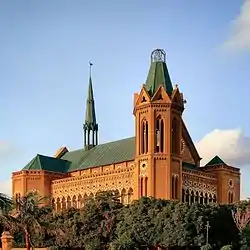 Frere Hall is one of numerous examples of colonial-era architecture in Civil Lines | |
| Coordinates: 24°51′N 67°03′E | |
| Country | |
| Province | Sindh |
| City | Karachi |
| Government | |
| • Constituency | NA-247 (Karachi South-II) |
| • National Assembly Member | Aftab Siddiqui (PTI) |
History
Civil Lines formed part of the "New Town" established during the colonial era, and developed shortly after the British gained control of Karachi from the Talpurs in 1839.[2] It was built to the east of the densely-populated "Native Town" (made up of Mithadar and Jodia Bazaar), and was specifically designed to be spacious area, in contrast to the densely populated Native Town. It was primarily residential, and was where much of the British officials and local elite resided in Karachi during the colonial era.[1] To the north of Civil Lines was the European commercial district of Saddar, and to the south the affluent seaside municipality of Clifton.
Following independence, the residential patterns established by the British continued, with Karachi's wealthy residents establishing affluent neighbourhoods in the southern and eastern parts of the city,[3] with poorer areas in the north and west.
There are several ethnic groups including Muhajirs, Punjabis, Sindhis, Kashmiris, Seraikis, Pakhtuns, Balochis, Memons, Bohras and Ismailis.
Main areas
- PIDC
- Bagh-i-Quaid-i-Azam
- Chief Minister House
- Governor House
- Sindh Secretariat
- Shafi Court
- Hotel Metropolis
- Pearl Continental Hotel
- Move n Pick
- Marriot Hotel
- Hijrat Colony
- Court of Law
- Dehli Colony
- Panjab Colony
- Hashmi Colony
- Kashmir Mujahid colony
- Frere Hall
- Artlary Madan
Gallery
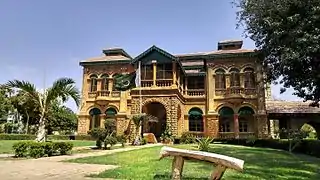 Quaid-e-Azam House is the former home of Pakistan's founder, Muhammad Ali Jinnah
Quaid-e-Azam House is the former home of Pakistan's founder, Muhammad Ali Jinnah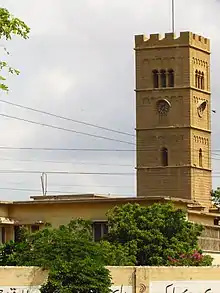
.jpg.webp) Victoria Museum building
Victoria Museum building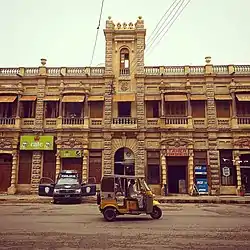 Edward House - one of several colonial-era commercial centres
Edward House - one of several colonial-era commercial centres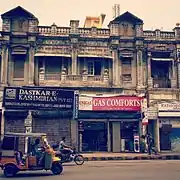 Victoria Mansion commercial building
Victoria Mansion commercial building
References
- Gayer, Laurent (2014). Karachi: Ordered Disorder and the Struggle for the City. Oxford University Press. ISBN 978-0-19-935444-3.
- Dutt, Ashok K.; Geib, M. Margaret (1998). Atlas of South Asia: A Geographic Analysis by Countries. Oxford & IBH Publishing Company. ISBN 978-81-204-1277-4.
- Brunn, Stanley D.; Hays-Mitchell, Maureen; Zeigler, Donald J. (2008). Cities of the World: World Regional Urban Development. Rowman & Littlefield. ISBN 978-0-7425-5597-6.